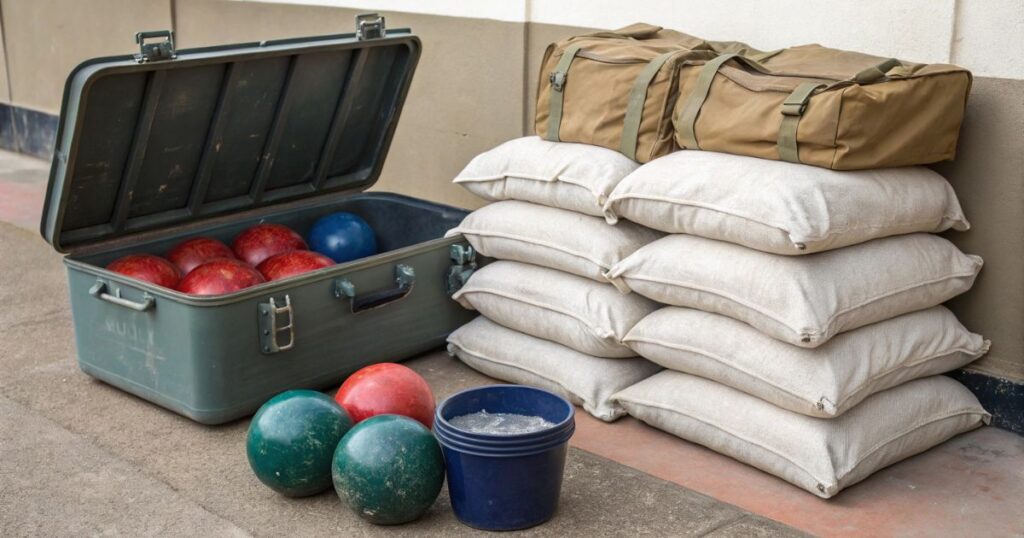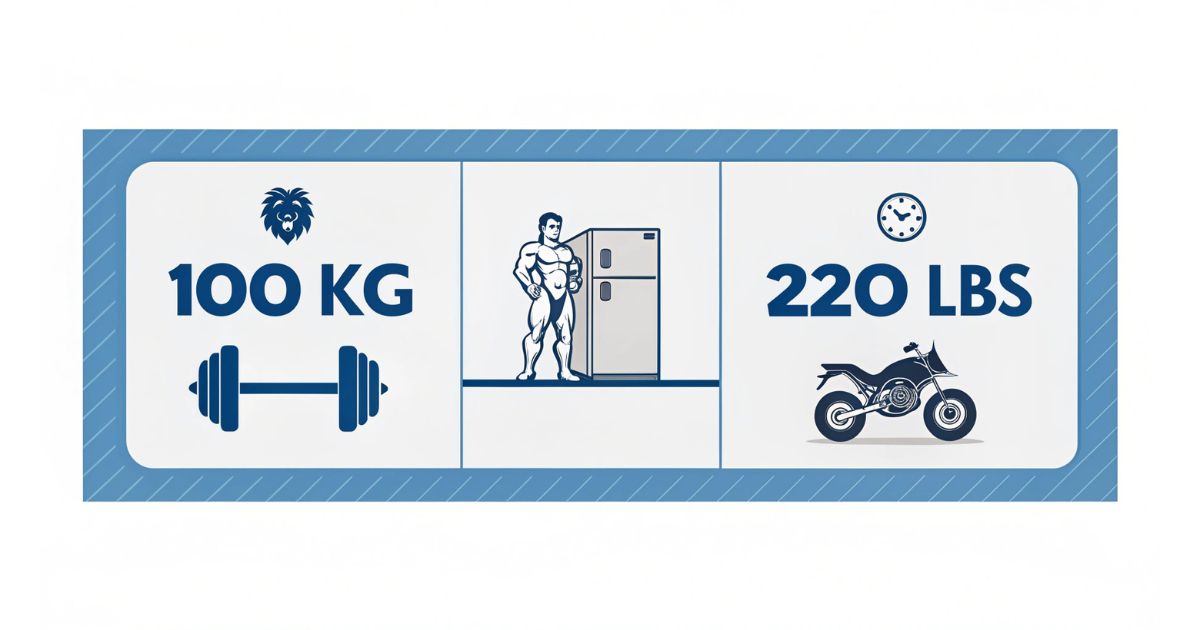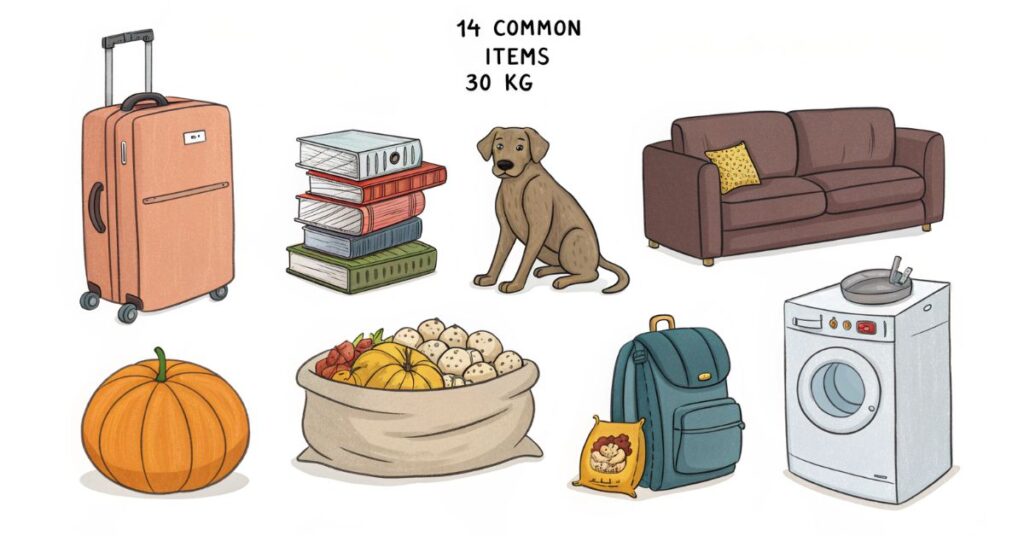Have you ever wondered what 100 kg actually feels like in everyday terms? If you’re in the USA, understanding this weight measurement can seem tricky since we usually think in pounds. But don’t worry – this guide will break it down into simple examples you can picture right away.
What Is 100 kg?
100 kg is a standard unit of mass in the metric system used worldwide. This weight equals about 220 pounds, which is roughly the size of an average adult male. This measurement appears everywhere – from gym equipment to shipping boxes to body weight discussions.
100 kg Quick Reference Table
| Term | Meaning |
| 100 kg | Standard metric unit of mass |
| 100 kilograms | Same value, spelled out fully |
| 100 kg weight | Used for body weight, lifting, or heavy objects |
| 100 kg equals | 220.46 pounds / 100,000 grams / 0.1 metric ton |
| What weighs 100 kg | Refrigerators, lions, motorcycles, washing machines |
| Daily life use | Gym workouts, shipping, furniture, bulk products |
How Much Is 100 kg?
100 kg to Pounds (lbs) – The American Perspective
100 kg equals 220.46 pounds – that’s the most important translation for American readers. To calculate this yourself, multiply any kilogram amount by 2.20462. So 100 × 2.20462 = 220.46 lbs. This simple math works every time.
100 kg in Stones (UK/Imperial System)
100 kg equals 15.75 stone in the British measurement system. Stone is still used in the UK and Ireland for measuring body weight, though it’s becoming less common. One stone equals 14 pounds, making this a middle ground between pounds and kilograms.
100 kg Conversion Comparison Table
| Unit | 100 kg Conversion |
| Pounds (lbs) | 220.46 lbs |
| Stone | 15.75 stone |
| Grams | 100,000 g |
| Metric Tons | 0.1 metric ton |
| Ounces | 3,527.4 oz |
| US Short Ton | 0.11 tons |
Common Things That Weigh 100 kg
Animals That Weigh 100 kg

Adult Male Lion
A fully grown male lion typically weighs between 90 and 110 kg (198-242 pounds). These powerful predators represent raw strength and dominance in the animal kingdom. When you think about lifting or moving 100 kg, imagine trying to carry a lion – that’s the great quantity of force involved.
Full-Grown Kangaroo
Large male kangaroos reach around 100 kg when fully grown. These Australian animals use their powerful legs to jump incredible distances. Their tail alone can weigh 15-20 kg and acts as a balance. Despite their size, kangaroos move with amazing speed and agility.
Large Dog Breeds
Several dog breeds reach or exceed 100 kg. The Great Dane typically weighs 90-110 kg, making it one of the tallest dog breeds in the world. St. Bernard dogs range from 85-105 kg and were originally bred for rescue work in snowy mountains. English Mastiffs can reach 95-110 kg as gentle giants.
Household Items and Appliances Weighing 100 kg

Standard Refrigerator
Most full-size refrigerators weigh between 90 and 110 kg (200-240 pounds) when empty. This makes them one of the heaviest appliances in your home. Moving day becomes challenging when you need to transport a fridge, often requiring two strong people or professional movers.
Washing Machine (Front Load)
Front-loading washing machines typically weigh 95-105 kg due to concrete counterweights inside. These blocks prevent the machine from shaking violently during spin cycles. The heavy weight keeps the unit stable even when washing large loads at high speeds.
Large Safe
Home and office safes often weigh around 100 kg or more. This weight serves as a security feature – thieves can’t easily carry away a 220-pound safe. Steel construction and locking mechanisms add up to substantial mass that protects your valuables.
Upright Piano (Small)
Smaller upright pianos weigh between 100 and 150 kg. The wooden frame, strings, keys, and internal mechanisms all contribute to this mass. Moving a piano requires special equipment and expertise because of both weight and delicate construction.
Sports and Fitness Equipment at 100 kg

Olympic Barbell with Plates
In powerlifting and weightlifting, 100 kg represents a significant milestone. An Olympic barbell weighs 20 kg (44 pounds), so you need 80 kg (176 pounds) in plates to reach 100 kilograms total. This load challenges intermediate to advanced lifters.
Heavy Punching Bag
Professional-grade punching bags weigh between 90 and 110 kg. These bags provide resistance for serious martial artists and boxers. The heavy weight prevents the bag from swinging too much during powerful kicks and punches.
Gym Weight Stack
Many cable machines at gyms have weight stacks that max out at or near 100 kg. These stacks consist of rectangular plates connected by a pin system. When you pull the cable, you’re lifting a portion of this great quantity of metal.
Vehicles and Transportation
Small Motorcycle/Scooter
Mopeds and small motorcycles typically weigh 80-110 kg depending on the model. This makes them light enough for one person to move if needed. The combination of metal frame, engine, wheels, and fuel tank reaches right around 100 kilograms.
Electric Bicycle (Heavy Duty)
Cargo e-bikes and heavy-duty electric bicycles can reach 90-100 kg with their motors, batteries, and reinforced frames. These bikes carry groceries, kids, or cargo but pay a price in weight. The battery pack alone might weigh 10-15 kg.
Everyday Objects and Materials

Four Bags of Cement
Standard cement bags weigh 25 kg (55 pounds) each in most countries. Four bags equal exactly 100 kg – a common purchase for small to medium construction projects. DIY homeowners often buy cement in these quantities for fence posts, small pads, or repairs.
Large Travel Suitcase (Fully Packed)
An oversized suitcase stuffed completely full might reach 90-100 kg. Of course, this far exceeds airline limits, which typically max at 23 kg (50 pounds) per checked bag. But when packing for permanent moves or shipping household goods, cases can hit 100 kilograms.
100 Liters of Water
One liter of water weighs exactly one kilogram at standard temperature. Therefore, 100 liters equals 100 kg – a perfect mathematical relationship. A large aquarium, water cooler bottle collection, or rain barrel might contain this great deal of water.
Ten Bowling Balls
Standard bowling balls weigh around 10 kg (22 pounds) each. Ten balls equal 100 kg – imagine carrying that in a lot of trips! This example works well because most Americans have bowled and know how heavy one ball feels.
100 kg to Other Weights
100 Grams vs 100 Kilograms
The difference is a factor of 1,000 – a massive scale gap. 100 grams feels light in your hand, while 100 kilograms requires serious effort to move. This comparison helps illustrate metric system scaling from everyday items to heavy loads.
What weighs 100 grams? A medium apple weighs about 100 grams – crisp, healthy, and easy to hold. A cup of granulated sugar measures close to 100 grams, perfect for baking recipes. A small notebook or journal typically weighs around 100 grams, light enough for any bag.
More Post: How Heavy is 12 Kg? 10 Common Things That Weigh 12 Kilograms
Question’s
Is 100 kg equal to 1 ton?
No, 100 kg is not equal to 1 ton. One metric ton equals 1,000 kilograms, so 100 kg equals only 0.1 metric tons (one-tenth of a ton). In US measurement, a short ton equals 2,000 pounds, so 100 kg equals approximately 0.11 US tons. The difference between kilograms and tons is significant – you’d need 10 times more weight to reach a full ton.
What is 100 kilograms equal to?
100 kg equals 220.46 pounds, 15.75 stone, 100,000 grams, or 0.1 metric tons. These conversions help understand the weight in different measurement systems. For most Americans, remembering 220 pounds gives the clearest picture. The metric system makes conversions simple by using factors of 10, 100, or 1,000.
What weight is 100 kg in stones?
100 kg equals 15.75 stone in the UK Imperial system. To be precise, that’s 15 stone and 10.5 pounds. Stone measurements remain popular in Britain for body weight, though less common in other countries. One stone equals 14 pounds or approximately 6.35 kilograms.
How much is 100 kg in body weight?
100 kg body weight equals 220.46 pounds for a person. This sits slightly above average for American men and well above average for women. Whether this weight is healthy depends on height, muscle mass, and body composition. A 6-foot athlete might be fit at 100 kg, while a shorter person might need to lose weight.
Is 100 kg a healthy weight?
It depends on your height and body composition. For someone 6 feet tall (183 cm) with good muscle mass, 100 kg can be healthy. For someone 5’5″ (165 cm), this weight would likely indicate overweight status. BMI provides rough guidance but doesn’t account for muscle. Consult healthcare providers for personalized assessment rather than using simple charts alone.
What is 100 weight equal to?
“Hundredweight” is a different measurement from 100 kg. In the US, one hundredweight equals 100 pounds (45 kg). In the UK, one hundredweight equals 112 pounds (51 kg). This historical unit causes confusion because it matches neither metric nor modern usage. Most countries have moved away from hundredweight toward kilograms for clarity.
What is 100 kg also called?
100 kg is called “100 kilograms” or “220.46 pounds” depending on the system. Some regions use “quintal” informally for 100 kg, especially in agriculture. In gym culture, lifters might say “two plates plus” when discussing 100 kg on certain exercises. The scientific community uses kilograms as the standard word for this measurement worldwide.
Conclusion
Understanding 100 kg opens up clearer communication about weight in many life situations. Whether you’re setting fitness goals, planning a move, or buying heavy equipment, knowing that this equals 220 pounds helps you make informed decisions. The examples throughout this guide – from lions to refrigerators to gym equipment – give you mental reference points.

Welcome to Swiftnis.com! I manage this site to provide accurate and easy-to-understand measurement guides. My goal is to make measurements simple for everyone. Whether you need Conversions, Tools, or Tips, I’m here to help. Enjoy exploring and measuring with confidence!
















